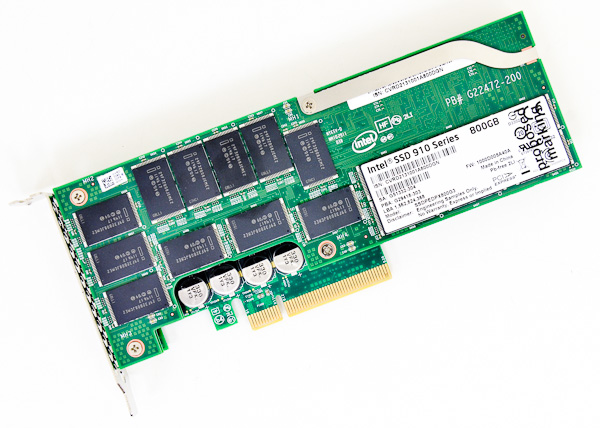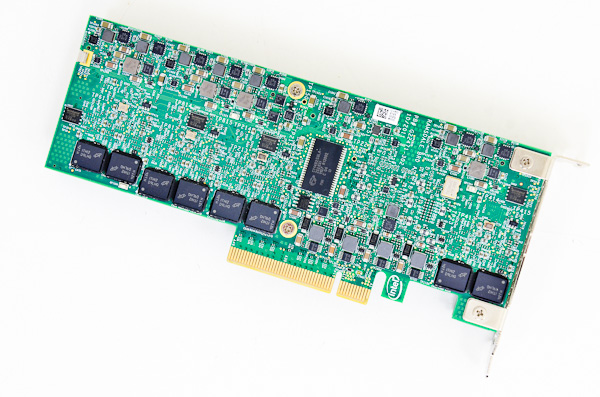The Intel SSD 910 Review
by Anand Lal Shimpi on August 9, 2012 1:00 PM EST- Posted in
- Storage
- SSDs
- Intel
- Intel SSD 910
Final Words
From a performance perspective, the Intel SSD 910 is an absolute beast. If you take into account encrypted or otherwise incompressible data performance, the 800GB 910 is easily the fastest SSD we've ever tested. The performance loss for the 400GB drive makes it a bit more normal, but it's still among the best. The only thing to be concerned about with the 910 is its poor low queue depth, small file write performance. If your workload is dominated by 2KB (or smaller) writes then the 910 isn't going to be a great performer and you'd be much better off with a standalone 2.5" drive. For all other workloads however, the 910 is great.
Pricing is also extremely competitive with other high-end enterprise PCIe offerings. Intel comes in at $5/GB for its top of the line enterprise SSD, despite the 710 being introduced at over $6 per GB. If you really want to get nostalgic, the old X25-E launched at over $15/GB. The cost per GB is much lower if you take into account how much NAND Intel is actually putting on board the 910. With 56 x 32GB 25nm MLC-HET die on a single 800GB 910, you're talking about around $2.23 per GB. I'd even be interested in seeing Intel offer a higher capacity version of the 910 with less endurance for those applications that need the performance but aren't tremendously write heavy.
Of course there's Intel's famed reliability to take into account. All of the components on the 910 are either widely used already or derived from SSDs that have been shipping for years. There's bound to be some additional firmware complexity but it's nothing compared to doing a completely new drive/controller. Most of the server shops I've worked with lately tend to prefer Intel's 2.5" SSDs, even though there are higher performing alternatives on the market today. The 910 simply gives these folks an even higher end option should their customers or workloads demand it.
My only real complaint is about the inflexibility on the volume side. It would be nice to be able to present two larger volumes (or maybe even a single full capacity volume) to the OS rather than four independent volumes on an 800GB 910. Some VM platforms don't support software RAID and at only 200GB per volume capacity could become an issue. You really need to make sure that your needs are properly lined up with the 910 before pulling the trigger.
As a secondary issue, although I appreciate the power of Intel's SSD Data Center Tool, I would like to see something a bit easier to use. Not everyone wants to grok hexadecimal temperature values (although doing so wins you cool points).
Overall I'm pleased with the 910. It's (for the most part) a solid performer, it's competitively priced and it should last for a good while. If you're space constrained and need to get a lot of local IO performance in your server, Intel's SSD 910 is worth considering.












39 Comments
View All Comments
lorribot - Thursday, August 9, 2012 - link
I like the idea but coming from a highly redundant arrays point of view how do you set this all up in a a safe and secure way, what are the points of failure? what happens if you lose the bridge chip, is all your data dead and buried?Would you be looking to put say 3 of these cards in a server and software raid 5 across the cards for multiple disks?
No hardware raid solution will work across multiple PCI-e cards so there really needs to be some work in how to manage all this in a sensible way needs to be done.
I doubt any one in an Enterprise would stick one of these in a server and use it as primary storage for their SAP database it is way too risky a proposition.
What would be good is a 3 1/5 format drive with a fibre channel interface that could work in existing storage solutions.
FunBunny2 - Thursday, August 9, 2012 - link
-- What would be good is a 3 1/5 format drive with a fibre channel interface that could work in existing storage solutions.If memory serves, that's what STEC made and hasn't been all that profitable.
Guspaz - Thursday, August 9, 2012 - link
At the end of the first page, "performnace"happycamperjack - Thursday, August 9, 2012 - link
Wouldn't it be more fair to compare it to a 800 gb CM88 R4 since it's around the same capacity and price as the intel 910 and quite a bit faster.Elixer - Thursday, August 9, 2012 - link
What happens when it is over 60% full on these things ? I am betting a huge drop off in speed, just like the desktop parts.MrSpadge - Sunday, August 12, 2012 - link
Probably not, since they're >50% overprovisioned.Jammrock - Thursday, August 9, 2012 - link
I would like to see some Fusion-IO tests. They are generally considered the highest end in enterprise SSDs. I've played with some in the past and they were crazy fast and reliable.puffpio - Friday, August 10, 2012 - link
agreed..any thoughts on a heads up between this and a similar capacity fusion io iodrive2?happycamperjack - Friday, August 10, 2012 - link
http://hothardware.com/Reviews/Intel-SSD-910-PCI-E...hmmmmmm - Saturday, August 11, 2012 - link
unfortunately, they are comparing the 910 to a 2009, discontinued card from fusion-io. would like to see a new card in the comparison to be able to compare what's on the market today